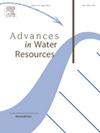A Multi-GPUs based SWE algorithm and its application in the simulation of flood routing
IF 4.2
2区 环境科学与生态学
Q1 WATER RESOURCES
引用次数: 0
Abstract
Hydrodynamic simulation based on shallow water wave equations (SWE) is one of the most useful methods for flood routing analysis. However, its widespread application in large-scale basin flood disaster prevention is hindered by significant computational efficiency challenges. Addressing this issue, a hydrodynamic algorithm based on multi-GPUs is provided, and the program named as CoSim-SWE is developed in this study. In the algorithm, the computational domain is partitioned into multiple subdomains, and assigned to each single GPU device to improve the computing power and efficiency. The accuracy of the multi-GPUs algorithm is validated based on two benchmarks. To demonstrate its practical utility, the developed CoSim-SWE is used to reconstruct the process of “11·03″ flood routing induced by the dam breach of Baige barrier dam on the Jinsha River, Sichuan province, China. The numerical results are compared with the field investigations. Furthermore, computational efficiency of the CoSim-SWE is also analyzed, which shows the developed multi-GPUs algorithm significantly can be better used for simulation of the large-scale flood routing with high-efficiency.
基于多gpu的SWE算法及其在洪水路由仿真中的应用
基于浅水波动方程的水动力模拟是洪水路径分析中最有用的方法之一。然而,其在大规模流域洪水防灾中的广泛应用受到计算效率挑战的阻碍。针对这一问题,本文提出了一种基于多gpu的流体动力算法,并开发了CoSim-SWE程序。该算法将计算域划分为多个子域,分配给单个GPU设备,以提高计算能力和效率。基于两个基准测试,验证了多gpu算法的准确性。为验证该方法的实用性,利用开发的CoSim-SWE对四川金沙江白葛坝溃坝引发的“11·03″”洪水走向过程进行了模拟。数值计算结果与现场调查结果进行了比较。此外,还分析了CoSim-SWE算法的计算效率,表明所开发的多gpu算法能够高效地用于大规模洪水路由的模拟。
本文章由计算机程序翻译,如有差异,请以英文原文为准。
求助全文
约1分钟内获得全文
求助全文
来源期刊

Advances in Water Resources
环境科学-水资源
CiteScore
9.40
自引率
6.40%
发文量
171
审稿时长
36 days
期刊介绍:
Advances in Water Resources provides a forum for the presentation of fundamental scientific advances in the understanding of water resources systems. The scope of Advances in Water Resources includes any combination of theoretical, computational, and experimental approaches used to advance fundamental understanding of surface or subsurface water resources systems or the interaction of these systems with the atmosphere, geosphere, biosphere, and human societies. Manuscripts involving case studies that do not attempt to reach broader conclusions, research on engineering design, applied hydraulics, or water quality and treatment, as well as applications of existing knowledge that do not advance fundamental understanding of hydrological processes, are not appropriate for Advances in Water Resources.
Examples of appropriate topical areas that will be considered include the following:
• Surface and subsurface hydrology
• Hydrometeorology
• Environmental fluid dynamics
• Ecohydrology and ecohydrodynamics
• Multiphase transport phenomena in porous media
• Fluid flow and species transport and reaction processes
 求助内容:
求助内容: 应助结果提醒方式:
应助结果提醒方式:


